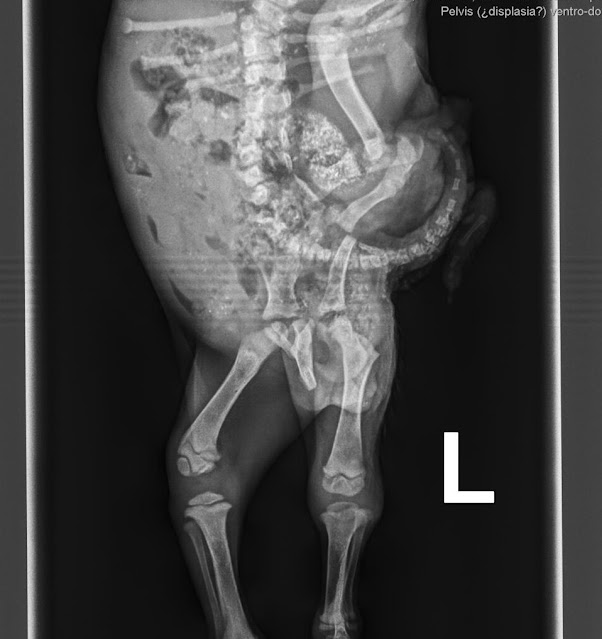I am Mia. She is a surprising pet who was born with a singular and distinguishing situation. She was born with 5 legs and two tails, which is one thing that may be very unusual to watch.
When it got here to caring for or funding the pet’s specialised remedy, Mia’s homeowners might solely present for her.
The pet was taken in by Casas Cunas Animal Shelter, which additionally took care of discovering Mia the perfect remedy potential. Provided that she is barely two months previous and has a big tummy, she will likely be dewormed.
Mia has an additional paw and tails which might be near her abdomen. She additionally has two anuses and two vaginas, and he or she has extra genetic sicknesses that trigger her to make the most of her two anuses as urinals.
She wants extra exact x-rays and ultrasounds earlier than the required medical procedures may be carried out, so the shelter is at the moment asking for donations to assist together with her surgical procedure.
The opposite puppies in Mia’s litter have all been adopted, they usually haven’t all been affected by the identical illness.
In 2021, a veterinarian at Neel Veterinary Hospital handled a pet named Skipper. It’s believed that Skipper was meant to have a twin, however they failed to totally separate, leaving the pet with six legs, two tails, two pelvic areas, and two reproductive programs at start.
It is possible that Mia has the identical congenital start situation.
After 5 days, Mia’s first of two procedures have to be carried out. Mia has had ongoing veterinarian remedy.
Her most up-to-date report is promising, and it’s hoped that the pet could have a protracted life. Serving to her proper now could be difficult and dear.
By telling Mia’s story, animal activists are hoping to boost cash for her anticipated surgical procedure.
Caring for animals involves various aspects to ensure their well-being and happiness. Here are some detailed methods for animal care:
- Proper Nutrition: Providing balanced and appropriate nutrition is essential for the health of animals. Consult with a veterinarian to determine the best diet for your specific animal, considering factors like age, species, and health status. Ensure access to clean water at all times.
- Regular Exercise: Just like humans, animals need regular physical activity to stay healthy. Make sure they have enough space to move around and engage in natural behaviors. For pets like dogs, daily walks and playtime are crucial.
- Routine Veterinary Care: Schedule regular check-ups with a qualified veterinarian to monitor your animal’s health and address any issues promptly. Vaccinations, parasite control, and dental care are all important aspects of veterinary care.
- Safe Environment: Create a safe and comfortable environment for your animals. This includes shelter from extreme weather conditions, protection from predators (if applicable), and providing appropriate bedding or housing materials.
- Socialization: Many animals are social creatures and require interaction with conspecifics or humans. Ensure that they have opportunities for socialization to prevent loneliness and behavioral issues.
- Grooming: Regular grooming helps maintain the health and appearance of animals. This includes brushing their fur or feathers, trimming nails, and cleaning ears and eyes as needed. Some animals may require professional grooming services.
- Mental Stimulation: Enrichment activities are essential for keeping animals mentally stimulated and preventing boredom. Provide toys, puzzles, or other forms of enrichment to keep them engaged and prevent destructive behaviors.
- Training and Behavioral Management: Proper training is crucial for pets to understand boundaries and follow commands. Positive reinforcement techniques are generally the most effective and humane way to train animals.
- Monitoring Health Signs: Learn to recognize signs of illness or distress in your animals, such as changes in appetite, behavior, or physical appearance. Promptly address any concerns by consulting with a veterinarian.
- Responsible Breeding and Ownership: If you’re involved in breeding animals, do so responsibly, prioritizing the health and welfare of both the parents and offspring. Additionally, only adopt or purchase animals if you can provide them with a lifelong commitment of care.
- Environmental Conservation: For animals in the wild or those in captivity, supporting conservation efforts and advocating for their protection is crucial. This includes preserving natural habitats, combating wildlife trafficking, and supporting ethical wildlife tourism.
- Legal Compliance: Familiarize yourself with relevant laws and regulations pertaining to animal care and welfare in your area. Ensure that you meet all legal requirements for owning or caring for animals.
By following these detailed methods, you can ensure that the animals under your care lead healthy, happy lives.









